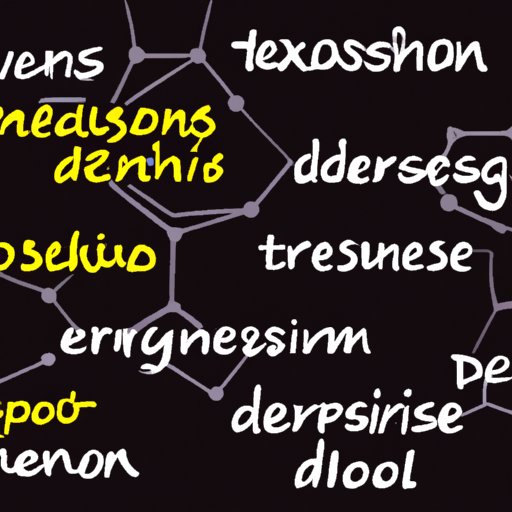Introduction
Depression is a disorder that affects millions of people around the world. It can cause feelings of sadness and hopelessness, as well as physical symptoms such as fatigue and insomnia. Depression can also have a significant impact on a person’s ability to function in daily life, leading to problems with work, relationships, and self-care. While the exact causes of depression are not fully understood, there is a growing body of evidence that suggests it is caused by a combination of biological, psychological, and environmental factors.
In this article, we will explore the science behind depression, looking at the neurochemistry, genetics, environment, stress, brain structural changes, hormones, neurotransmitters, and diet associated with the disorder. We will review the latest research on the topic and offer recommendations for further study.
Reviewing the Neurochemistry of Depression
The neurochemistry of depression is complex and involves several different neurotransmitters, including serotonin, norepinephrine, and dopamine. These neurotransmitters play a key role in regulating mood, sleep, appetite, and other aspects of mental health. When levels of these neurotransmitters are out of balance, it can lead to depression.
In addition to neurotransmitters, another important factor in understanding the neurochemistry of depression is neuroplasticity. Neuroplasticity is the process by which the brain adapts and changes in response to experience. Research has shown that individuals with depression often have reduced connectivity between certain brain regions, which may contribute to their symptoms.
Examining the Genetics of Depression
Genetics plays an important role in depression. Studies have found that individuals with a family history of depression are more likely to develop the disorder themselves. In addition, certain genetic mutations have been linked to an increased risk of depression.
Researchers have identified several known genetic differences between people with depression and those without. For example, some studies have shown that people with depression may have a higher expression of certain genes involved in the regulation of emotion and behavior. Other studies have found that people with depression may have different levels of certain neurotransmitters, such as serotonin.

Exploring The Role of Environment and Stress in Depression
Environment and stress can both contribute to depression. Environmental factors such as poverty, violence, and trauma can increase the risk of developing depression. Similarly, stressful experiences such as divorce, death of a loved one, or job loss can also increase the risk.
It is important to note that while environmental and stress factors can contribute to depression, they are not the only causes of the disorder. Research has shown that genetics and other biological factors also play a role in its development.

Investigating the Brain Structural Changes Associated with Depression
Research has shown that there are several brain structures that are affected by depression. These include the hippocampus, amygdala, and prefrontal cortex. The hippocampus helps regulate emotions, while the amygdala is involved in fear and anxiety. The prefrontal cortex helps regulate decision making and problem solving.
Brain structural changes can alter mood, cognition, and behavior. For example, research has shown that people with depression have lower volumes of gray matter in certain areas of the brain. This can lead to changes in how the brain processes information and emotions, which can contribute to depression.

Analyzing the Role of Hormones in Depression
Hormones also play an important role in depression. Cortisol is a hormone released in response to stress and has been linked to depression. High cortisol levels can lead to changes in the brain, including decreased volume in certain areas, which can then contribute to depressive symptoms.
Other hormones, such as estrogen and testosterone, have also been linked to depression. Research has shown that fluctuations in these hormones can affect mood and behavior, which can lead to depression.
Discussing the Role of Neurotransmitters in Depression
Neurotransmitters are chemicals that help transmit messages between neurons in the brain. They play an important role in regulating mood, and imbalances in certain neurotransmitters can lead to depression.
Two neurotransmitters that have been linked to depression are GABA and acetylcholine. GABA helps regulate anxiety and stress, while acetylcholine is involved in memory and learning. Imbalances in these neurotransmitters have been linked to depression.

Examining the Relationship between Diet and Depression
Diet can also play an important role in depression. Nutrition is essential for overall health and wellbeing, and deficiencies in certain vitamins and minerals can lead to changes in mood. For example, low levels of omega-3 fatty acids, B vitamins, and magnesium have all been linked to depression.
In addition, certain supplements such as St. John’s Wort and SAMe have been studied for their potential to treat depression. However, it is important to speak with a doctor before taking any supplement, as some supplements can interact with medications or have other side effects.
Conclusion
In summary, depression is a complex disorder that is affected by many different factors. Neurochemistry, genetics, environment, stress, brain structural changes, hormones, neurotransmitters, and diet all play a role in its development and treatment. Research into these topics is ongoing, and more studies are needed to better understand the underlying causes of depression.
It is important to remember that depression is a treatable disorder. With proper diagnosis and treatment, it is possible to manage the symptoms of depression and improve quality of life.
(Note: Is this article not meeting your expectations? Do you have knowledge or insights to share? Unlock new opportunities and expand your reach by joining our authors team. Click Registration to join us and share your expertise with our readers.)
